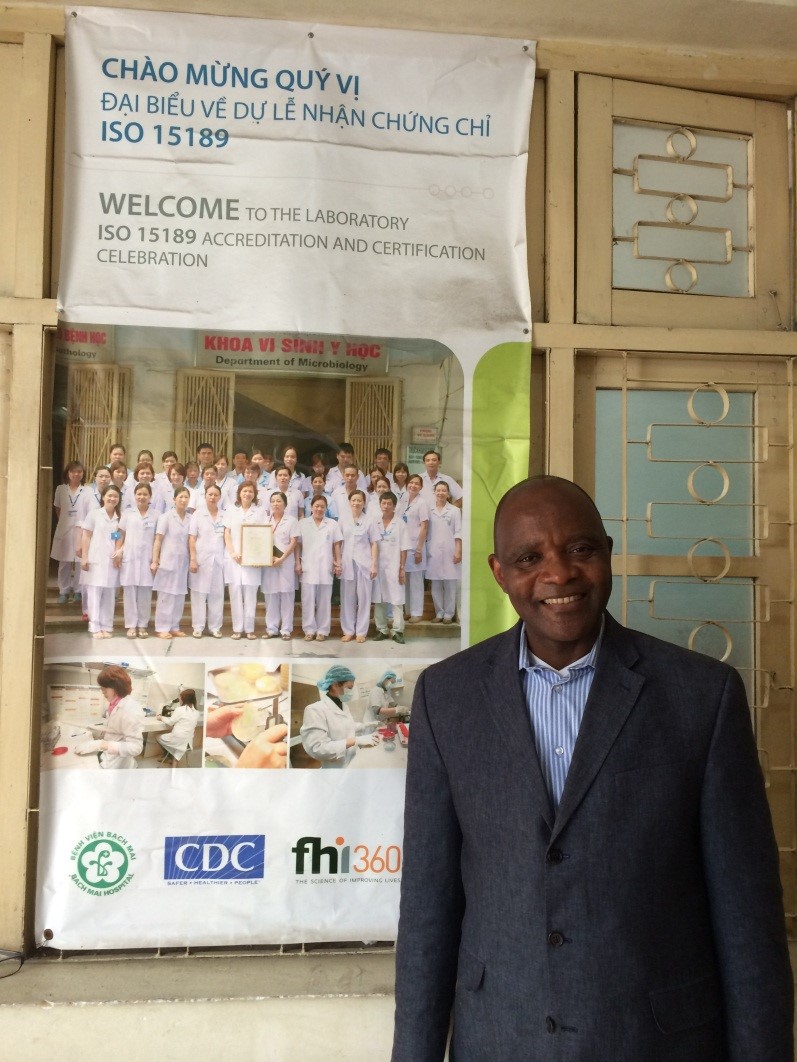CDC Strengthens Public Health Laboratory Systems in Vietnam

John Nkengasong visiting HCMC's National Pediatric Hospital Microbiology Laboratory, which received ISO 15189 accreditation in January 2014
Before Vietnam was selected to be a PEPFAR focus country in 2004, there were no laboratories accredited to an international standard, no HIV testing guidelines, no laboratory national strategic plan, and no quality management requirements or training for laboratory staff.
“Many of the first laboratories I visited then had outdated equipment and poor management. There was so much to be done to improve the quality of the laboratories for better diagnosis and treatment for patients,” said Dr. Hien Bui, Senior Laboratory Team Lead who has worked for the CDC Laboratory Branch for seven and a half years.
Apart from developing national policies and strategic plans to improve HIV and TB testing over the last 10 years, the CDC Laboratory team has strategically focused on systems strengthening activities that will have a long-term impact on the overall public health infrastructure.
“When I first started at CDC Vietnam in 2008, my only resources were a small, dedicated team of laboratory experts and a limited budget. The logical approach to improve laboratory services was to implement low cost technical assistance activities built on ‘platforms’ within the Vietnam Ministry of Health (MOH),” explained Kyle Bond, Chief of the CDC Laboratory Branch.
The support CDC provides through training programs such as the Strengthening Laboratory Management Towards Accreditation (SLMTA), training on quality management systems (QMS) and laboratory information systems (LIS) have led to 3 additional public health laboratories receiving international–level accreditation in just 2014 alone – Hanoi’s National Pediatric Hospital Hematology Laboratory, Hai Duong Preventive Medicine Center, and HCMC’s National Pediatric Hospital Microbiology Laboratory. Altogether, CDC has supported a total of 10 laboratories to achieve ISO accreditation, including the reference labs for HIV and TB.
Currently, the Laboratory branch is in its second round of training SLMTA and expanding the program to support the TB, public health and military laboratory systems, which has built interest and momentum within MOH to have more laboratories operating at international standards. In addition, the Laboratory team worked to address a shortage of qualified laboratorians to staff these facilities by standardizing and updating the medical technology education provided at 5 major medical universities in Vietnam.
“From what I saw, your laboratory program seems to be close to a ’tipping point’ in terms of achieving a critical mass or threshold of laboratories with accreditation,” said John Nkengasong during his visit in July, Senior Advisor of the CDC International Laboratory Branch and co-chair of the OGAC technical working group for laboratory. “In fact, you are at the edge of effecting a sociological change that is spreading quickly and can fuel a whole movement of clinical laboratories to embrace a sustained culture of implementing continuous laboratory quality management systems.”